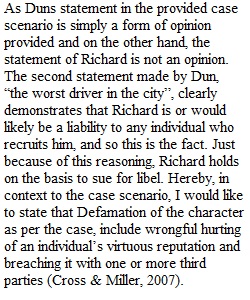


Q 6-1) Richard is an employee of the Dun Construction Corp. While delivering materials to a construction site, he carelessly backs Dun’s truck into a passenger vehicle driven by Green. This is Richard’s second accident in six months. When the company owner, Dun, learns of this latest accident, a heated discussion ensues, and Dun fires Richard. Dun is so angry that he immediately writes a let- ter to the union of which Richard is a member and to all other construction companies in the community, stating that Richard is the “worst driver in the city” and that “anyone who hires him is asking for legal liability.” Richard files a suit against Dun, alleging libel on the basis of the statements made in the letters. Discuss the results. (See Intentional Torts against Persons.)
Q Response to 6-6 6.6) Ronald Rawls and Zabian Bailey were in an auto accident in Bridgeport, Connecticut. Bailey rear-ended Rawls at a stoplight. Evidence showed it was more likely than not that Bailey failed to apply his brakes in time to avoid the collision, failed to turn his vehicle to avoid the collision, failed to keep his vehicle under control, and was inattentive to his surroundings. Rawls filed a suit in a Connecticut state court against his insurance company, Progressive Northern Insurance Co., to obtain benefits under an underinsured motorist clause, alleging that Bailey had been negligent. Could Rawls collect? Discuss. Chapter 7: Jason Clark, an experienced hunter, bought a paintball gun. Clark practiced with the gun and knew how to screw in the carbon dioxide cartridge, pump the gun, and use its safety and trigger. Although Clark was aware that he could purchase protective eyewear, he chose not to buy it. Clark had taken gun safety courses and understood that it was “common sense” not to shoot anyone in the face. Clark’s friend, Chris Wright, also owned a paintball gun and was similarly familiar with the gun’s use and its risks.Clark, Wright, and their friends played a game that involved shooting paintballs at cars whose occupants also had the guns. One night, while Clark and Wright were cruising with their guns, Wright shot at Clark’s car, but hit Clark in the eye. Clark filed a product liability lawsuit against the manufacturer of Wright’s paintball gun to recover for the injury. Clark claimed that the gun was defectively designed. During the trial, Wright testified that his gun “never malfunctioned.” In whose favor should the court rule? Why? Response to 7-2 Response to 7-4 David Dobrovolny bought a new Ford F-350 pickup truck. A year later, the truck spon- taneously caught fire in Dobrovolny’s driveway. The truck was destroyed, but no other property was damaged, and no one was injured. Dobrovolny filed a suit in a Nebraska state court against Ford Motor Co. on a theory of strict product liability to recover the cost of the truck. Nebraska limits the application of strict product liability to situations involving personal injuries. Is Dobrovolny’s claim likely to succeed? Why or why not? Is there another basis for liability on which he might recover? Explain. Chapter 8: John and Andrew Doney invented a hard-bearing device for balancing rotors. Although they obtained a patent for their invention from the U.S. Pat- ent and Trademark Office, it was never used as an automobile wheel balancer. Some time later, Exetron Corp. produced an automobile wheel balancer that used a hard-bearing device with a support plate similar to that of the Doneys’ device. Given that the Doneys had not used their device for auto- mobile wheel balancing, does Exetron’s use of a similar device infringe on the Doneys’ patent? Why or why not? Response to 8-2 Response to 8-5 SilverEdge Systems Soft- ware hired Catherine Conrad to perform a singing telegram. SilverEdge arranged for James Bendewald to record Conrad’s performance of her copyrighted song to post on its Web site. Conrad agreed to wear a microphone to assist in the record- ing, told Bendewald what to film, and asked for an additional fee only if SilverEdge used the video for a commercial pur- pose. Later, the company chose to post a video of a different performer’s singing telegram instead. Conrad filed a suit in a federal district court against SilverEdge and Bendewald for copyright infringement. Are the defendants liable? Explain.
View Related Questions